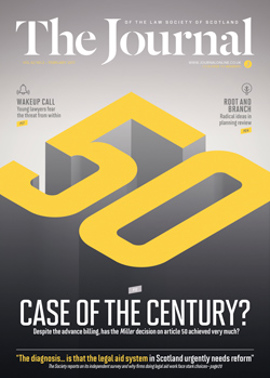Turning up the heat on workplace change
Last year (Journal, August 2016, 31) I explored potential changes on Brexit. Much remains opaque. Does that mean that pensions law is marking time?
Quite the reverse – there is currently a high level of activity. Mostly not due to Brexit, but instead changes and protections arising from business activity (most recently and spectacularly, the BHS scheme collapse and Tata’s proposed changes to the British Steel scheme), the developing workplace and work patterns and more statutory and regulatory changes. There has also been a steady stream of court decisions and Ombudsman determinations.
The outcomes will affect businesses and other organisations, employees and pension savers, with impact much wider than just for pension schemes.
Case law
Recent and upcoming cases on a range of subjects will have a ripple effect on workers and businesses on a strategic and transactional as well as day-to-day level.
The Court of Appeal decided in Horton v Henry [2016] EWCA Civ 989 that a bankrupt’s right to elect to drawdown pension does not constitute income within s 310(7) of the Insolvency Act 1986, and he could not be forced by the insolvency practitioner to exercise that right.
The “Judges” case, McCloud v Ministry of Justice ET/2201483/2015, held that the age of the judge, irrespective of length of service, with younger judges being offered an inferior pension scheme, could not be justified as “a proportionate means of achieving a legitimate aim” and there was discrimination on the grounds of age. Unsurprisingly, that group of younger judges contained a much higher proportion of female or ethnic minority members. This decision is likely to lead to scrutiny of and changes to pension arrangements for private sector and other public sector workers.
In Danvers v Revenue & Customs Commissioners [2016] UKUT 569 (TCC), the interaction of a payment from a third party to a member of a self-invested personal pension plan (or SIPP), following investment by the SIPP in that third party, was considered. It was held that the connection triggered anti-avoidance provisions, and a tax charge and surcharge applied. The decision will have implications for investments by SIPPs and also personal financial planning.
This spring, the Court of Appeal will hear the appeal in Bradbury v BBC, on implied duties of employers when making changes. Employer duties, in particular that of trust and confidence and good faith, get another airing when the Court of Appeal hears the next round of IBM United Kingdom Holdings Ltd v Dalgleish (see [2015] EWHC 1439 (Ch)).
Disputes on equalisation of pension age are still going, with the Court of Appeal hearing the appeal from Safeway Ltd v Newton [2016] EWHC 377 (Ch) in the summer; and just last month the Family Court in England ruled that a husband had to pay income from previously concealed pension assets held abroad to his ex-wife: Goyal v Goyal [2017] EWFC 1.
Closer scrutiny
High-profile business weakness or collapse poses challenges for Government, trustees and the Pensions Regulator, as clearly demonstrated during the select committee sessions on the BHS scheme collapse.
A green paper on defined benefit pension reform is expected, as a precursor to legislation, covering funding, protection of pension value and regulatory changes. It will hopefully address at least some of the challenges for trustees and the Pension Regulator, and could have profound implications for business.
The Pension Regulator’s consultation paper on 21st century trusteeship will also lead to changes in how schemes are run, with knock-on effects for employers.
Auto-enrolment regime review
Not every employer and qualifying employee has started paying contributions but the DWP plans to press ahead with its first review. Will the review result in a change to the current timescale for contribution increases?
Fixed penalty notices for non-compliance are common; in Q4 2016 the Regulator issued 2,919 of those, but only 870 escalating penalty notices.
EU impact continues
The IORP Directive (2003/41/EEC), requiring full funding for cross-border defined benefit pension schemes, came into force in January 2017, with a 24 month period for member states to pass national legislation. For the UK this means only some additional requirements before Brexit, because it already has complied with much of its content.
The ramifications of Barber v Guardian Royal Exchange [1990] EUECJ R-262/88, requiring equal treatment for men and women, have still not been fully worked through. Successive governments have not legislated on how to equalise that part of pensions known as guaranteed minimum pensions or GMPs, due to the inequality in state pension ages in the UK. Will 2017 be the year we see legislation?
These are just a selection of developments in pensions law which are contributing to and indeed leading on workplace change – watch this space.
In this issue
- Miller, Brexit and BreUK-up
- Power to the people?
- Prerogatives, Parliament and the constitution: plus ça change?
- Decisions in high places
- Reading for pleasure
- Journal magazine index 2016
- Opinion: Callum Sinclair
- Book reviews
- Profile
- President's column
- Have you heard of ScotLIS?
- People on the move
- Article 50: the final say
- Where courts fear to tread
- "Wake up": how young lawyers see the future
- How healthy is our legal aid system?
- Challenging assumptions
- Planning to deliver
- Contact and the fear factor
- And the bill goes to...?
- Pakistan to join Child Abduction Convention
- Dress to impress?
- Handcuffing of prisoners and article 3
- Turning up the heat on workplace change
- Scottish Solicitors' Discipline Tribunal
- Not just for the green welly brigade
- Five by five
- Law reform roundup
- Relief over pensions and bankruptcy ruling
- Helpline plus
- Spill the beans on legal aid fraud
- The art of bringing the good news
- Cybercrime: how are you protected?
- Ask Ash
- One year rule becomes three
- From the Brussels office






